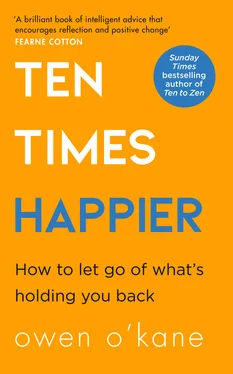CHAPTER 2
GET OUT OF YOUR HEAD
Have you ever stopped to consider that your mind, and how you relate to it, might play an enormous role in how happy you are? With absolute confidence, I can assure you it does. My mind once sabotaged my happiness on a mindfulness retreat! I’ll explain.
I had always thought of myself as a mindful and pretty chilled kind of guy. That was until I attended a mindfulness teacher-training course.
It was an intensive retreat over nine days, with very early starts and late finishes – often after 10 p.m. Most meals were in silence and large parts of the day were spent practising mindfulness. Set in a beautiful location in the heart of the countryside, it should have been the perfect place for calm. We were privileged to have the inspirational Melanie Fennell (a very respected figure in the world of therapy and mindfulness) as our coach – and her words ‘just notice’ played a huge part in my training. But calm didn’t come easy.
Before the course I had envisaged nine days of peace and tranquillity leading to a blissful state of contentment. But I was wrong. Once I had the space to breathe and find silence, I discovered that my mind didn’t stop.
• If it wasn’t worrying, then it was planning.
• If it wasn’t thinking about the future, then it was replaying the past.
• If it had nothing to do, then it would start wondering what was for dinner or what the other participants were doing.
I thought I was a pretty calm person, but I was astounded to discover I had a mind on overdrive that didn’t quite know how to slow down.
The experience was uncomfortable but an incredible breakthrough. My mind was getting in the way of living and of my happiness . And this realization was swiftly followed by another – that I would now be a lot better at being able to identify with, and help, my clients for whom this was also a problem.
The volume of the noise in my head was astounding. For example, it was day four of the course and I was seated ready for a forty-five-minute guided mindful meditation. The focus was compassion. I had been looking forward to this meditation and had made a decision that it was going to be a perfect, peaceful one.
This was not the case. Even before the meditation started, I was irritated with my position in the room, as it was close to a door. I had planned to arrive on time to get a better seat but I’d been delayed. This started a self-attack in my head: ‘You idiot, why did you arrive so late?’ There wasn’t much compassion happening at this stage!
And it got worse. My next irritation was a person close to me breathing too loudly, followed by a cramp in my leg, and then my tummy started to gurgle louder than it has ever done in my life. The noise in my head got louder, the self-criticism strengthened and suddenly I was telling myself this was all a waste of time. I was deflated, disappointed and by that stage I just wanted to give up on the course. Here I was, a therapist on meditation training, and I couldn’t get the basics right.
When the meditation session had ended, I had an opportunity to discuss the experience with my mentor. I described what happened and to my surprise, she smiled. ‘Wow,’ she said. ‘Sounds like a great meditation.’
I was stunned. What was so great about that? But as she explained, it was a great meditation because I had noticed my mind. I had noticed all of the activity and frustration. But it hadn’t stopped me trying to meditate. It was fine if I noticed all of the activity in my mind – noticing it didn’t mean I had to engage with it. This was one of the most liberating moments of my life. I realized I needed to learn the skill of managing my mind and regulating the volume.
Our minds are at the centre of all our experiences. You are learning the skill of taking back control of your mind, so it doesn’t take control of you.

I believe that most human distress relates to what goes on in our minds. Regardless of the event, how we feel about it always links back to how our minds interpret it. That will always vary from person to person. Going on a roller coaster terrifies me, whereas my partner behaves like an excited child! Essentially, it’s difficult to live a happy life if you haven’t got a handle on your mind.
A client, Nick, who was struggling with anger issues and depression, described in a session with me an event in his life that perfectly illustrated this. One day, he was driving to work and he encountered a delay at a railway level crossing. Nick was only one car away from getting past the gate but just as he approached, the gate came down and he was forced to stop. Even though it is standard procedure for a gate to block traffic crossing the rail tracks when a train is passing through – in fact, it’s vital for safety – he was furious. He got out and started to scream at the car in front of him for not driving fast enough. He kicked the gate at the level crossing and then returned to his car to persistently sound his horn until the train had passed and the gate was raised.
When we explored his actions, Nick was able to reflect that, at the time, his mind felt ‘as if it were going to explode’. He wanted to get to his destination quickly and his mind was telling him:
• This is just your bad luck
• This shouldn’t be happening
• You will be late getting to work
• Why do trains get priority?
• The driver in front of you caused the problem
• This isn’t fair.
Nick had listened to these thoughts, started to engage with them and then responded by screaming, jumping out of his car, and sounding his horn continuously.
In this moment Nick’s mind was inappropriately in threat mode. His amygdala, the centre in the brain that protects us from danger, was telling him there was a threat and he should react accordingly. There wasn’t any real danger but his threat system reacted because something hadn’t gone to plan. But by following the steps outlined on pages 47–9, Nick could have had a very different reaction. If Nick had allowed himself time and space to acknowledge but not to engage with the content of his mind, his thoughts would have been quieter and more flexible, and would perhaps have played out something like this:
• That’s a shame but it’s OK, I can wait
• Better to be safe than have an accident
• I’ll listen to the radio while waiting.
The more Nick is able to practise this approach, then the easier it becomes for him longer term.
Can you see the difference in his thoughts? And how they in turn would have produced a very different reaction, too? If we believe everything our minds tell us it won’t always produce a rational, sensible outcome.
UNDERSTANDING OUR MINDS A LITTLE MORE
We have around 60–80,000 thoughts per day according to neuroscientific research. Some of the research indicates that as much as 60 to 70 per cent of thought content can be negative in nature. When I say negative, let me give some context. Back in Neanderthal times it was helpful to have fearful protective thoughts as a means of staying safe from predatory animals. The problem is we have evolved as a species and we don’t need as many of these types of thoughts to protect us any more.
It’s important to understand that most of our thoughts are automated processes and link closely with our life experiences, culture, rules, beliefs and predisposition. This is how our neurological pathways develop thought patterns. In simple terms, we have often formed habitual ways of thinking that are the ‘norm’ for us but not necessarily helpful. Don’t fret though because, like all habits, thought habits can be unlearnt.
Читать дальше













